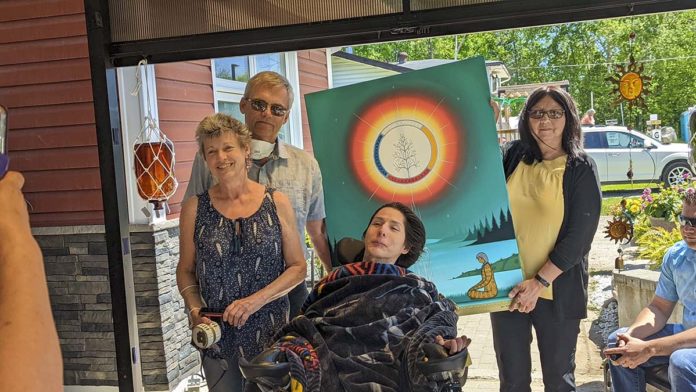AUNDECK OMNI KANING—With their current police agreement up for renewal soon and statistics that show an increase of 600 percent over the past year in drug related warrants, arrest and drug and weapons seizures, not to mention other increases in crime statistics, the United Chiefs and Councils of Manitoulin Anishnaabe Police Service is lobbying for an increase in funding for additional staffing.
“We are facing all the same, big issues that the big police departments in southern Ontario and other areas are seeing,” stated UCCM APS Chief of Police James Killeen, at the police annual meeting last week. However, “they have the human resources to deal with gangs, for example, but we don’t. We have a really good relationship with the OPP (Ontario Provincial Police) and Wiikwemkoong Tribal Police and we meet a lot and work together really well.”
“The OPP recognizes the issues that all our police departments are facing and are trying to get more staff in place,” said Chief of Police Killeen. He explained the UCCM APS is in its final year of the policing agreement, “and we have been, and will push for more funding and more officers. Our officers do a tremendous job, but we don’t have enough officers to fully take care of all of our communities.”
“I have been here one-and-a-half years and our service has seen incredible changes. It has been a very challenging year,” the police chief stated. “Our police services has been hit hard with the pandemic from the officers and civilian officers’ perspective as well. “I never thought I would ever see a world where everyone would be required to have vaccines. And it created a division in communities between those in favour and those against getting vaccinated.”
The UCCM APS covers six First Nation communities in the Manitoulin Island area (Wiikwemkoong is covered by its own local police service). “A lot of things, including COVID, played into the significant increase we saw in drug cases and charges,” said Police Chief Killeen. “I could see the changes over a long time even before these issues hit the Island.”
The police chief said UCCM APS currently has 21 officers and they are lobbying for double that number to provide for at least four platoons of 6-7 officer on duty at one time and to move from two sergeants to four. “In my previous 23 years of policing, I never saw an officer being called back after their shift. Here, when a homicide took place, calls went out for support and everyone came in. We need to be comparable to bigger police departments and we need the personnel and resources that they have.”
Over the past 15 months and in statistics for 2021, Police Chief Killeen said, “drug trafficking has increased close to 700 percent, and we have already surpassed this in 2022. There are a lot of issues.”
In trying to lay drug charges and other related charges, “we have to have the information and people on the inside who know this is going on, to provide this information,” said Police Chief Killeen. “When the recent homicide took place we went to various community meetings and the police were heavily criticized,” continued Police Chief Killeen. He outlined the problem being, “that we were aware of the person selling drugs, but to get a warrant for an arrest we need people who have information about what is going to happen, stating, for example that on this date and time someone is selling drugs at this address in a community.”
Along with addressing the drug issue in the communities and the need for more staffing on the police services, another major issue the police service is dealing with is mental health. “Just six months before I arrived here on the Island, a police officer (OPP Constable Marc Hovingh) was murdered,” said the police chief. “Officers on the Island know each other as well as members of their community. When something like this happens, it affects all members of the policing staff team. They begin to think that if it can happen to Marc, it can happen to me. It’s a shock to everyone and it affected a lot of officers and staff team members.”
“And then we had one of our employee, Steve Newbold, die at work,” said Police Chief Killeen. “He was helping us tremendously, and we are still recovering from that as well.”
The police chief said that Indigenous Police Chiefs of Ontario (IPCO) commissioned a study to look at the effects of policing and the mental health of all staff. There were four main findings of the study. Based on these findings, 27 recommendations were made to address the shortfalls. UCCM APS has shared the findings with staff and had a session with Meredith Brown of Calibrate, who wrote the mental health report, and a meeting was held in Garden River to review the study. “We continue to advocate for our staff to address mental health.”
“While we are addressing the mental health needs of our employees, we are also looking at ways to address mental health calls within our communities. We have many recurring calls for service, sometimes with the same individuals, and with alcohol sometimes exacerbating the situation,” said Police Chief Killeen. “To that end we were successful in our application to address mental health. We received funding from SOLGEN to hire two mental health workers who will be on staff to assist/accompany officers on mental health calls. We will also be hiring/contracting a mental health clinician who can make direct referrals if necessary. This project is called Mino Bmaadziwin.”
“As the organization grows, we need more staff with specialized skillsets. We saw three new civilians join the team last year: A community mobilization assistant, human resources administrator and a finance/IT coordinator. As we continue to implement new technologies and to address staffing shortages on the operations side, we are returning the court officer to a civilian position and separating the finance and IT positions as the workload is increasing, especially for IT,” he continued.
“On the operations side, we added a detective sergeant who works with our two detective constables in the crime unit,” the police chief continued.
“I want to thank our staff, our police commission, our leadership and our communities. We need you to continue to work with us for the benefit of our future generations. A huge shout out too, to all our community policing partners. We are partners in community wellness,” Police Chief Killeen added.





